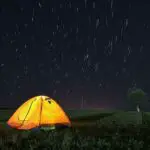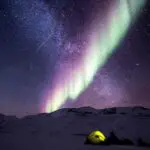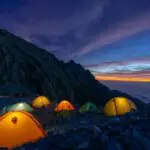Key Takeaways
- 1.Camping gear includes equipment like tents, sleeping bags, and cook sets.
- 2. Camping gear is used to make camping more comfortable and convenient.
- 3. Tents are the most important piece of camping gear, as they provide shelter from the elements.
- 4. Sleeping bags keep you warm at night and cook sets help you prepare meals while camping.
When it comes to enjoying the great outdoors, having the right camping gear is essential. From a comfortable tent to keep you dry and sheltered, to a warm sleeping bag for those chilly nights, having quality gear can make all the difference. Of course, don’t forget the cook set so you can enjoy some tasty meals while you’re out in nature! Whether you’re an experienced camper or just getting started, be sure to have all the gear you need for a fun and safe trip.
What are the different types of camping gear?
Most people think of a sleeping bag when they think of camping gear, but there is so much more to consider! A tent is another critical piece of equipment, providing a portable shelter made out of fabric and other materials. Other types of camping gear that are important to consider include air mattresses, cots, sleeping mats, tarps, ropes and bungee cords, tent stakes (tent pegs), canteen or water bottles, and first-aid kits.
The sleeping bag is often the most expensive item on the list, but it is worth investing in a good one. Look for a bag that will keep you warm in all temperatures and conditions. down bags are ideal for cold weather camping, while synthetic fill bags are better suited for warmer climates. Be sure to choose a bag that fits your height and width so you can comfortable sleep inside it.
A tent is another essential piece of gear. There are many different types and sizes available on the market today. Think about how many people you need to accommodate inside the tent as well as what kind of weather conditions you’ll be facing when choosing which one to buy. Once you have your tent set up, make sure to stake it down with some strong tent pegs so it doesn’t blow away in high winds!
There are lots of other smaller items that can make your camping trip more enjoyable too. Air mattresses or cots can provide added comfort when sleeping outdoors. Sleeping mats help insulate your body from the cold ground beneath you at night. Tarps can be used as extra protection from the sun or rain during the day or as an emergency shelter if your tents tears during the trip.
What are the essential pieces of camping gear?
There are a few essential pieces of camping gear that every camper should have before heading out into the wilderness. The first is a tent, which will provide shelter from the elements and keep you dry during rain or snow. Sleeping bags and sleeping pads are also important, as they will ensure you’re comfortable when sleeping outdoors. A camping pillow can also be helpful for getting a good night’s sleep. Headlamps or flashlights are crucial for seeing in the dark, and camp chairs and a camp table can make your campsite more comfortable.
What are some non-essential but still useful pieces of camping gear?
There are a lot of things that you don’t need in order to go camping, but which can still be quite useful. Here are five example of such non-essential but still useful pieces of camping gear:
- 1. Marshmallow Roasting Sticks: These are great for making s’mores or just roasting marshmallows over the campfire. They’re also usually pretty cheap, so they’re a great addition to any camper’s arsenal.
- 2. Pot Scraper: This is a really handy tool for cleaning pots and pans after cooking meals over the campfire. It can make cleanup a lot easier and faster.
- 3. Stainless Steel Chopsticks: These come in handy for cooking as well as eating food from cans or jars (like beans). They’re also reusable, so you don’t have to worry about wasting disposable utensils.
- 4. Guyline Tighteners: These are essential for keeping your tent guy lines nice and tight, which will help keep your tent stable in windy conditions.
How do you choose the right camping gear for your needs?
When you’re planning a camping trip, one of the most important things to consider is what kind of gear you’ll need. Depending on the type of camping you’re doing – car camping, backpacking, canoeing or kayaking – your equipment needs will vary. In this article, we’ll break down some of the key pieces of gear you’ll need for a successful camping trip, no matter what type it is.
One piece of essential camping gear is a good tent. When choosing a tent, think about how many people will be sleeping in it and what the weather conditions are likely to be. If you’re car camping and don’t have to worry about carrying your tent on your back, weight and size aren’t as big of concerns. But if you’re backpacking or canoeing/kayaking, every ounce counts so you’ll want to choose a lighter weight tent. Weather conditions are also important to consider when choosing a tent. If there’s a chance of rain or snow, make sure your Tent has adequate ventilation and waterproofing. Stakes are also an important part of setting up your Tent , especially in windy conditions. Don’t forget a Tent footprint too – this can help protect the bottom of your Tent from wear and tear (and prevent any critters from getting in!).
Sleeping bags are another key piece of gear for any camping trip. Again ,think about the temperature conditions where you’ll be Camping – if it’s going to be cold ,you’ll want A bag that’s rated for lower temperatures.
How do you care for your camping gear?
When it comes to taking care of your camping gear, one of the most important things you can do is clean your water bottles and hydration packs. This will help prevent bacteria from growing and will keep them from getting too dirty. Simply mix warm water with a tablespoon of baking soda and give them a good scrub. Rinse them off well with warm water and then allow them to air dry. Store them with the caps open so that any residual moisture can evaporate.
Your camping tent is another piece of gear that takes a lot of abuse. The rain, sun and dirt can all weaken the material and seams over time. Inspect your tent regularly for any signs of wear or damage. If you notice any, make sure to repair or replace it as soon as possible.
What should you do if you lose or damage a piece of your camping gear while out in the wilderness?
If you lose or damage a piece of your camping gear while out in the wilderness, don’t panic. There are a few things you can do to try and fix the situation. First, see if the item can be repaired. If it’s a small tear in a tent, for example, you may be able to patch it up with some duct tape. If the damage is more severe, however, you’ll need to improvise. See if there’s something else you can use that will serve the same purpose as the damaged item. For instance, if your sleeping bag has a hole in it, you might be able to substitute blankets or extra clothing.
It’s also a good idea to plan ahead and pack extra supplies in case something goes wrong. This way, if you do lose or damage an essential piece of gear, you’ll have a backup and won’t be left stranded in the middle of nowhere.
How can you pack your camping gear so that it is easy to carry and doesn’t take up too much space?
When packing for a camping trip, it is important to consider both how easy the gear will be to carry, and how much space it will take up. One way to achieve this is to repack food and other items into smaller containers. Another is to pare down gear to only what you need – or will at least use. Additionally, using packing cubes for clothes can help save space, as can buying collapsible or compact versions of camping gear. Look for multi-function gear that serves more than one purpose whenever possible. By following these tips, it should be possible to pack everything needed for a great camping trip while still keeping things light and manageable.
What are some common mistakes people make when buying or using camping gear?
When it comes to camping, there are a lot of different things that you need to take into account. One of the most important aspects is making sure that you have the right gear. There are a lot of different products on the market and it can be tempting to purchase cheaper items in order to save money. However, this is often a mistake as lower quality gear is more likely to break or not work properly when you need it most. It is always better to invest in good quality gear that will last for many years.
Another common mistake people make when purchasing camping gear is failing to do their research beforehand. It is important to read reviews and compare products before making any final decisions. Once you have your gear, it is also crucial to try it out before taking it on a camping trip. This allows you test its functionality and ensure that everything works as intended.
Frequently Asked Questions
What do I need for a 4 day camping trip?
A four-day camping trip requires careful planning and packing in order to ensure a comfortable and enjoyable experience. The following lists essential items for a campsite, as well as other miscellaneous items that should be considered when packing for a camping trip.
Tents, sleeping bags, sleeping pads, and camping pillows are essential for a campsite. Tents provide shelter from the elements and can be used for both sleeping and storage. Sleeping bags keep you warm at night and can be used in conjunction with a sleeping pad to provide additional insulation from the ground. Camping pillows offer neck support and can help you get a good night’s sleep.
There are other miscellaneous items you should consider bringing along such as tools and kitchen essentials. Tools may be needed to set up your tent or start a fire. Kitchen essentials include pots, pans, utensils, dishes, food storage containers, and coolers. It is also important to bring along enough food and water for everyone on the trip.
Clothing and footwear should also be considered when packing for a camping trip. Depending on the time of year and location of your trip, you will need to pack appropriate clothing to keep you warm or cool enough throughout the day/nighttime hours. Sturdy shoes or boots are necessary for hiking or exploring around the campsite area. Hatchets or knives may also come in handy when chopping wood for fires or preparing meals outdoors.
Finally, health hygiene..
How do you store food for a 3-day camping trip?
When packing food for a camping trip, it is important to keep all perishable items in a cooler. This will help keep the food fresh and prevent it from spoiling. Place different food items like various cuts of meat or different fruits in separate bags to keep them organized and easy to find. Keep the lid closed as much as possible on your cooler to maintain its internal temperature. If you are able to, pack ice packs or frozen water bottles in with the food to help keep everything cool.
What should I pack for a 3-day backpacking trip?
A three-day backpacking trip can be a rewarding and challenging experience, but it requires careful planning and packing to be successful. The first step is to determine the destination and purpose of the trip, which will help narrow down what items are necessary.
Next, make a packing list of all essential items, including clothing, shelter, sleeping gear, food and water, cookware, navigation tools, first aid kit, etc. Pack light but carefully, considering the weight and bulk of each item as well as how it will affect your overall comfort on the trail.
What you need for 3 days of camping?
When embarking on a camping trip, it is important to be prepared with the right supplies. This includes food items that will last the duration of the trip. Depending on how many days the camping trip will be, different types of food items should be brought. For a three-day camping trip, these are the recommended food items to pack:
For breakfast, bring oatmeal packets and pop tarts. Oatmeal is a healthy and filling option that can easily be made with just hot water. Pop tarts are also quick and easy to eat on the go. For lunch and dinner, bring canned soup, pasta, peanut butter, and bread. These options are all relatively lightweight and easy to cook over a campfire or stove. Canned soup can simply be heated up in its container; pasta only requires boiling water; peanut butter can be eaten with crackers or bread; and bread can be used for various sandwiches throughout the day. Finally, don’t forget snacks like granola bars, trail mix, jerky, and fruit cups. These will help keep you fueled in between meals.
What are luxury items for camping?
There is no one-size-fits-all answer to this question, as what may be considered a luxury item for camping by one person may not be viewed as such by another. However, there are certain items that tend to be considered luxury items for camping by most people, and these include portable fire pits, camp chairs, portable stoves, luxurious tents, Tonga torches, decorative mats and blankets, and electronics with a power source.
Of course, not everyone will view all of these items as being luxurious; some campers may feel that they can’t live without a particular item (such as a portable stove), while others may consider any kind of electronic device to be an unnecessary extravagance. Ultimately, it’s up to each individual camper to decide which items they view as being essential for their own comfort and enjoyment while camping.
My Personal Notes
I love camping! I remember when I was younger, my family would go on camping trips together and it was always so much fun. My favorite part was always setting up the tent and exploring the area. Of course, having the right gear is essential for a successful and enjoyable trip. That’s why I’ve put together a list of my must-have camping gear items.
First, you’ll need a good tent. Make sure to choose one that’s comfortable and spacious enough for everyone in your group. Then, pack some sleeping bags or blankets to stay warm at night.







